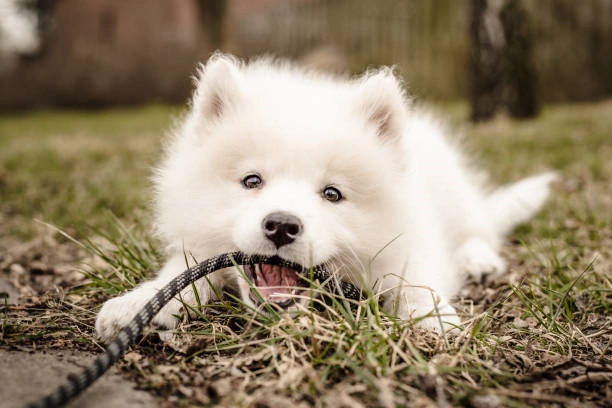Contents
Origin and History
The Samoyed dog, often called “Sammy,” is a majestic and ancient breed that traces its origins to Siberia, where it was bred by the nomadic Samoyede people. These dogs were indispensable to the Samoyede, serving as sled pullers, herders of reindeer, and guardians of their camps. Renowned for their endurance, strength, and gentle disposition, Samoyeds were also welcomed into the tents of their human companions, where their thick, warm coats helped keep families warm during the frigid Siberian nights. The breed’s close relationship with humans over thousands of years has shaped its friendly and affectionate nature. In the late 19th and early 20th centuries, explorers to the Arctic and Antarctic, such as Fridtjof Nansen and Roald Amundsen, used Samoyeds in their expeditions, recognizing their remarkable endurance and resilience in harsh climates. Today, Samoyeds are beloved family pets worldwide, admired for their beauty, intelligence, and joyful demeanor.

Physical Appearance
Samoyeds are perhaps best known for their stunning, fluffy white coats and the distinctive “Sammy smile.” This smile, created by the breed’s upturned corners of the mouth, is not just charming; it also helps prevent drooling, which could lead to icicles forming on their faces in freezing conditions. Their double-layered coat is one of their most distinctive features—dense, weather-resistant, and composed of a soft, insulating undercoat and a longer, coarse outer coat. This combination makes them perfectly suited for cold environments. Samoyeds are medium to large-sized dogs, typically standing between 19 to 24 inches at the shoulder and weighing between 35 to 65 pounds, depending on gender and build. They have a muscular and well-proportioned frame, with a broad chest and strong legs that convey both agility and strength. Their almond-shaped, dark eyes, set against their snow-white coats, give them an alert and intelligent expression. They also have erect, triangular ears that are well-furred and help them detect sounds, while their plumed tails, often carried over their backs, provide extra warmth when they curl up to sleep in cold conditions.

Personality and Temperament
Samoyeds are known for their friendly, affectionate, and sociable nature. They are often described as being “people dogs,” forming strong bonds with their families and thriving on human companionship. They are gentle, playful, and great with children, making them excellent family pets. However, Samoyeds are not just a bundle of joy; they are also intelligent and curious dogs with a strong work ethic inherited from their herding and sled-pulling ancestry. They are quick learners and eager to please, which makes them relatively easy to train, especially with positive reinforcement techniques. However, they can also be a bit stubborn or independent at times, reflecting their history as working dogs that often needed to make decisions on their own. Samoyeds are also known for their vocal nature—they are talkative dogs who often communicate through barks, howls, and even a unique range of vocalizations that sound like singing. This makes them good watchdogs, as they will alert their owners to any unusual activity, but it also means they are not ideal for someone looking for a quiet pet.
Health and Care Needs
Caring for a Samoyed involves a commitment to regular grooming and exercise. Their thick double coat requires frequent brushing—at least two to three times a week—to prevent matting and remove loose fur, especially during shedding seasons in the spring and fall. While their coats are generally self-cleaning and tend to repel dirt, occasional baths will help keep them looking their best. Beyond grooming, Samoyeds are an active breed that needs regular exercise to stay happy and healthy. Daily walks, playtime in a fenced yard, and activities that engage both their minds and bodies, such as agility or obedience training, are ideal. Due to their high energy levels, they are not well-suited for a sedentary lifestyle. Samoyeds are generally a healthy breed, but like all dogs, they are prone to certain genetic conditions. Potential health issues include hip dysplasia, progressive retinal atrophy, and hypothyroidism. Regular vet check-ups, a balanced diet, and a healthy lifestyle can help manage these risks.
Social and Environmental Needs
Samoyeds are highly social dogs that thrive in environments where they are part of the family’s daily activities. They dislike being left alone for long periods and can develop separation anxiety if not given enough attention or stimulation. They are happiest when they have plenty of opportunities for interaction, play, and companionship. Given their working dog background, they need a sense of purpose and benefit greatly from activities that challenge their minds and bodies. Interactive toys, puzzle feeders, and participation in dog sports like agility, herding, or sledding can help keep them engaged and content. While they are adaptable to various living conditions, they do best in homes with space to run and play. Due to their thick coats, they are more suited to cooler climates and may struggle in hot, humid environments. Proper measures, like providing plenty of shade, fresh water, and limiting exercise during peak heat, are necessary if they live in warmer areas.

Conclusion
In summary, the Samoyed is a beautiful and devoted breed that brings joy and energy to any home. With their signature smile, friendly disposition, and deep history as a working dog, they are beloved companions for families, singles, and active individuals alike. Their intelligence, loyalty, and playfulness make them wonderful pets for those who can meet their needs for companionship, grooming, and exercise. With the right care and love, a Samoyed will be a faithful and joyful member of the family, offering a lifetime of loyalty and affection.

